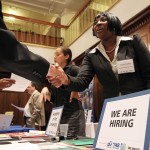Out-Of-Work Idaho Teens Could Be Out Of Luck

Molly Messick / StateImpact Idaho
Court Hanson, a college and career counselor at Boise High School, says he's worried about the lack of job opportunities for students.
The Associated Press highlights the problem of teen unemployment in piece published today. StateImpact devoted significant time to the issue earlier this year, not long after the Bureau of Labor Statistics released data showing Idaho has one of the highest teen unemployment rates in the nation.
Idaho’s teen unemployment rate was nearly 30 percent in 2011, BLS calculations showed. Andrew Sum of Northeastern University’s Center for Labor Market Studies stresses that Idaho, more than many states, has watched its teen labor force decline in recent years.
“In Idaho, if you went back to the late 1990s, you would have found that pretty close to 52 out of every 100 teenagers had a job in a given month,” he says. “Idaho ranked about 15th highest in the nation at that time.”
Then, Sum says, teen employment began to deteriorate. By last year, only 28 of every 100 teenagers had a job. “The magnitude of that decline is stunning,” Sum says. “The country also had a big dip, but it was much bigger in Idaho.”
Nationally, the teen employment rate is expected to sink to new depths in the decade ahead, according to the AP article published today.
“According to government projections, the teens entering the U.S. labor force are expected to decline another 8 percentage points by 2020. By that time, young adults ages 16 to 24 will make up 11 percent of the labor force. While increased schooling is a factor, much of the recent employment decline is due to increased competition from other age groups for entry-level jobs that teens normally would fill.” — The Associated Press
Like StateImpact‘s reporting, the AP article stresses the potential long-term impacts of teen joblessness. As Boise High college and career counselor Court Hanson explained in March, missing out on teen job experiences could mean that teens don’t learn simple but important things, like how to deal with customers and co-workers, and how to problem-solve in a work environment. “I’m worried that there is a group of teenagers that aren’t getting those work skills,” Hanson said.


